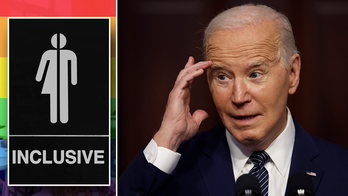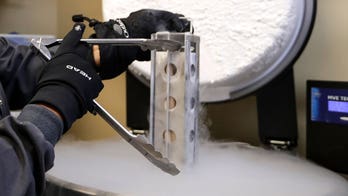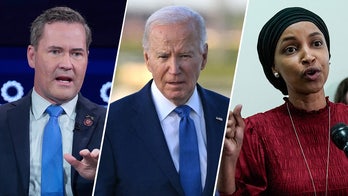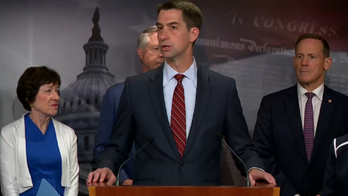Santorum Stands Out in First Debate
Those Democrats who argued that the killing of Usama bin Laden would shield President Obama from political attacks saw in the first presidential debate of the season that Republicans won’t be abashed about going after Obama, even on foreign policy.
Perhaps it was because Obama himself is participating in an extended victory lap after ordering the mission that killed bin Laden, but Republicans seemed to have no qualms about going after the commander in chief so soon after the greatest triumph of his presidency.
As former Minnesota Gov. Tim Pawlenty put it: “He did a good job and I tip my cap to him, but that moment is not the sum total of American foreign policy.”
The Republican presidential nominating process got off to a rollicking start Thursday in Greenville, S.C. The crowd at the FOX News/South Carolina GOP event heard about everything from bin Laden’s death to heroin legalization; global warming to reality TV.
Moderator Bret Baier and panelists Chris Wallace, Juan Williams and Shannon Bream got the sometime balky participants to loosen up and start the discussion that will ultimately end on Election Day 2012.
Like the Kentucky Derby that will be run on Saturday, any debate has favorites and long shots (and usually a couple of mudders). But unlike a horse race, winning or losing a debate is determined by more than what happens in the event itself.
Determining the winner of a debate is about answering this question: Who made the most progress toward the goal of winning the party’s nomination – a year-long process that will not be marked by steady advancement. In that context, Power Play offers the winner and the losers of the first-in-the-nation presidential derby.
Win -- Rick Santorum
The former Pennsylvania senator left elective office after taking a 2006 trouncing rare for a two-term incumbent. Controversies over his aggressive stances on social issues – equating homosexuality with incest, etc. – and the disappointment among his conservative base over Santorum’s decision to back liberal Republican Sen. Arlen Specter in a bitter 2004 primary fight left Santorum without an electoral base in Pennsylvania.
So his presidential candidacy had been something of a curiosity until Thursday night. But in the debate, Santorum brought the most energy, the strongest attacks and did so without falling into his past tendency to seem shrill or angry when engaging. His defense of family values as key to American greatness – that liberty and limited government depend on having a society that can take care of itself through families –sounded like a reasonable answer from a man for whom such issues have been a path to political success but also defeat.
Santorum can be called the winner of the debate simply because he defied expectations, sounded presidential and reminded Republicans why they liked him so much when he started his career. Another 1990s politician trying to make a comeback in a presidential run, Newt Gingrich, opted to pass on the debate. Watching Santorum make his case to the same core conservatives that Gingrich must win in order to be viable must have made the former speaker wonder why he snubbed South Carolina.
Santorum’s performance will bring him donations and admiration from the conservative base, and that’s all support and money that Gingrich is counting on if he expects to break into the top tier. Santorum may be taking Gingrich’s ticket off of the B Team.
While Santorum is still a long shot for the nomination, it looks likely that he will find enough support to stick around and continue the conversation at least into the fall.
Place -- Tim Pawlenty
It’s hard for the frontrunner in a debate to win because the other candidates usually gang up on him. But Pawlenty, the best known and best-funded candidate in the debate, was left unmolested by his fellow participants.
Pawlenty, though, didn’t make the most of the opportunity. In an effort to appear dignified and presidential, Pawlenty sometimes seemed stiff. As the debate season rolls on, Pawlenty will have to find a way to loosen up and look like he is having fun. It’s hard when you are the only top-tier candidate because of the desire to stand out as the serious choice, but voters want to see candidates who are at ease in the spotlight.
The debate was no loss for Pawlenty, though. He was in command on the issues and gave responses that will put the party’s conservative base at ease. Pawlenty also reinforced his blue-collar background – a union family in the meatpacking business, etc.
Pawlenty also passed on several chances to rip on the frontrunner in the race, former Massachusetts Gov. Mitt Romney, who, like Gingrich, sat out the debate. That’s a different tack than Pawlenty has taken before when he has zapped Romney’s mandatory health insurance program in Massachusetts. While such attacks make for good TV and get applause, they usually turn off undecided voters.
Pawlenty looked a little ill at ease in his maiden run, but he lost no ground and helped establish himself as a top-tier candidate. Even those who supported another candidate on the stage would have allowed that Pawlenty seemed the most plausibly presidential.
Show – Herman Cain
The crowd at the Peace Center and the members of a Frank Luntz focus group loved Cain’s plainspoken, simple answers.
When he shot back at Wallace’s question about Cain’s support of replacing the income tax with a national sales tax by saying “with all due respect, your experts are dead wrong” you could feel the crowd getting juiced.
He scored the line of the evening when asked a question, again by Wallace, about Cain’s viability as a candidate considering that he had never won an election before. Cain observed that most of the people in Washington had past political experience and then asked the crowd “How’s that working out for you?”
Cain, though, flopped on foreign policy. He offered the same evasive-sounding response to questions about the Afghan war and the war in Libya: that he would have to talk to his generals after being elected and come up with a strategy.
That’s not going to cut it in a party that takes the issue of national security very seriously. For Cain to have twice punted on those issues at a moment when attention has sharply returned to the subject was the sign of a grave weakness in his presidential portfolio.
Cain is in many ways the ideal candidate for a party that is embracing the Tea Party and rejecting the political establishment. Cain pleases crowds for the same reason that Donald Trump had a fortnight’s flicker with GOP voters – he talks straight, he’s a businessman and he’s not a professional politician.
We will hear a lot more from Cain, but if he is to be as a viable presidential candidate, he is going to have to find a way to fill in the gaps on national security. Voters may say they care the most about jobs, the economy or debt, but in the end, they know that protecting the country is the president’s primary job.
The Rest of the Field – Paul and Johnson
There is a fight going on in the libertarian wing of the Republican Party over whether Texas Rep. Ron Paul or former New Mexico Gov. Gary Johnson will be their standard bearer. That question may have been answered definitively on Thursday.
Paul, the granddaddy of the Tea Party movement, showed how he has helped move the GOP to the right. His answers are always thought-provoking and sometimes hilarious. He got a crowd in conservative stronghold South Carolina to cheer for heroin legalization by telling them that they wouldn’t start shooting up if the government stopped telling them not to.
Johnson? Well… that horse seemed to be running on a different track than the rest of the pack.




